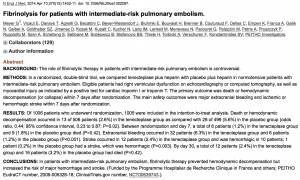Critical Appraisal of a Therapeutic Study
Its now time to pull all the theory together and critically appraise a therapeutic study in the last of our podcasts.
In this podcast we review the PIETHO Study using a CASP; RCT checklist.
Again the paper is a free open access paper.

Have a read of the paper, run through the checklist, have a listen to the podcast and then to consolidate answer the questions below.
Quiz Summary
0 of 7 Questions completed
Questions:
Information
You have already completed the quiz before. Hence you can not start it again.
Quiz is loading...
You must sign in or sign up to start the quiz.
You must first complete the following:
Results
Results
Time has elapsed
Categories
- Not categorized 0%
- 1
- 2
- 3
- 4
- 5
- 6
- 7
- Current
- Review
- Answered
- Correct
- Incorrect
-
Question 1 of 7
1. Question
Randomisation was performed in order to make groups equal at baseline?
CorrectIncorrect -
Question 2 of 7
2. Question
The primary outcome was a composite outcome?
CorrectIncorrect -
Question 3 of 7
3. Question
The clinical significance of the composite outcomes was similar?
CorrectIncorrect -
Question 4 of 7
4. Question
Performing a per protocol analysis would have been preferable to the intention to treat analysis that occurred in the study?
CorrectIncorrect -
Question 5 of 7
5. Question
The results of the study were described in terms of odds ratios.
'Death or hemodynamic decompensation occurred in 13 of 506 patients (2.6%) in the tenecteplase group as compared with 28 of 499 (5.6%) in the placebo group (odds ratio, 0.44; 95% confidence interval, 0.23 to 0.87; P=0.02)
The fact that the 95% confidence intervals didn't cross 1 means that this is an insignificant result?
CorrectIncorrect -
Question 6 of 7
6. Question
'Death or hemodynamic decompensation occurred in 13 of 506 patients (2.6%) in the tenecteplase group as compared with 28 of 499 (5.6%) in the placebo group (odds ratio, 0.44; 95% confidence interval, 0.23 to 0.87; P=0.02)
The p-value would be deemed statistically significant?
CorrectIncorrect -
Question 7 of 7
7. Question
'Death or hemodynamic decompensation occurred in 13 of 506 patients (2.6%) in the tenecteplase group as compared with 28 of 499 (5.6%) in the placebo group (odds ratio, 0.44; 95% confidence interval, 0.23 to 0.87; P=0.02)
The p-value indicates the magnitude of the therapeutic effect that tenecteplase holds?
CorrectIncorrect
